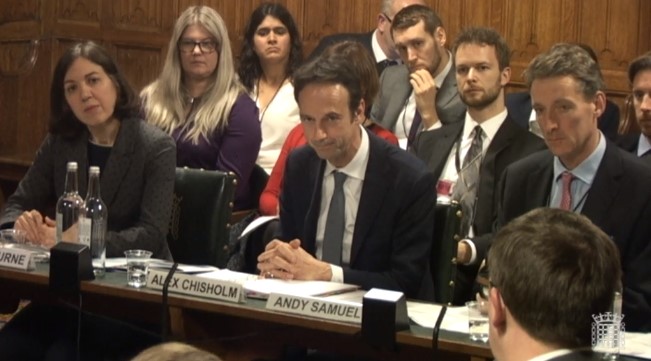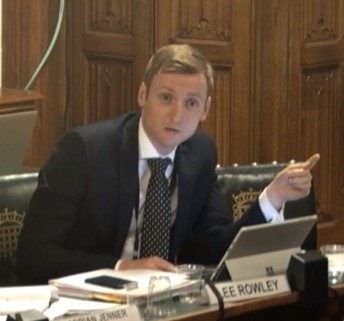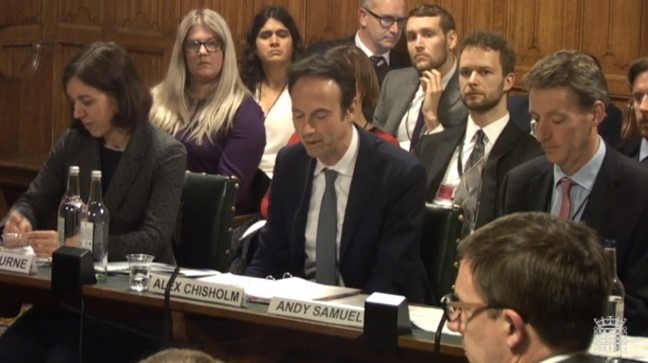
From left: Emily Bourne, Alex Chisholm and Andy Samuel giving evidence to the Public Accounts Committee, 11 February 2019. Photo: Parliament TV
A Conservative MP said this evening he was disappointed with the response of senior civil servants to his questions on the decommissioning of shale gas wells.

Lee Rowley MP at the Public Accounts Committee, 11 February 2019. Photo: Parliament TV
Lee Rowley (left), who has a prospective Ineos shale gas site in his North East Derbyshire constituency, wanted to know what would happen if shale gas companies went out of business before land had been restored.
He said the questions had still not been answered, many years after the start of attempts to frack.
Mr Rowley raised the issue at Westminster during a meeting of the Public Accounts Committee. It was taking evidence from Alex Chisholm, the Permanent Secretary at the Department for Business, Energy and Industrial Strategy, and Emily Bourne, the department’s Director for the Energy Development and Resilience Directorate.
Mr Rowley told the civil servants:
“The reason I ask you is because this has not been adequately answered anywhere and I want an answer to it.”
Miss Bourne (above left) replied:
“As with the offshore, there’s a liability on the operator going forwards. The Environment Agency is the regulator for environmental issues onshore. They will consider these issues as part of their permit and their regulatory regime.”
Mr Chisholm (above right) said:
“If the company is no longer responsible or is no longer in existence anybody else responsible associated with that, the Environment Agency – not one of our agencies – enforces a polluter pays principle.
“Ultimately, I think the landowner has responsibility.”
The committee’s chair, Meg Hillier, responded:
“It is all a bit vague isn’t it?”
Mr Rowley added:
“Landowners are potentially being forced to allow fracking to happen on their land, contrary to their wishes. Ineos threatened to take the National Trust to court for that, for example, under the 1966 Mines Act.
“How can it be the landowners’ responsibility for something that has occurred on their land that they didn’t want to happen?”
Disappointment
After the meeting, Mr Rowley said:
“I am disappointed that the department and the OGA were unable to give clear answers on the pressing questions around decommissioning.
“Whatever one’s thoughts on the fracking industry as a whole, it cannot be right that these questions, which could lumber the country with hundreds of millions, or even billions of pounds of liability, are unanswered now many years into attempts to frack.
“I will continue to pursue this.”

From left: Emily Bourne, Alex Chisholm and Andy Samuel giving evidence to the Public Accounts Committee, 11 February 2019. Photo: Parliament TV
The committee had been discussing decommissioning of North Sea oil and gas wells. The Oil and Gas Authority had provided members with a booklet on the process. Mr Rowley asked when a similar booklet would be produced for the onshore industry. Ms Bourne replied:
“At the moment we have got a very small scale – we have got two sites – one of which I think has already been plugged and abandoned.”
She said BEIS could consider a similar document.
Mr Rowley replied:
“I don’t want your consideration. I want you to tell me when I will see one?”
He said fracking sites could require decommissioning in far less than 50 years and some of the companies may not be in business when that happened.
Meg Hillier asked:
“How big does the industry have to be before you start planning the decommissioning?”
Miss Bourne replied:
“It is one of the things we take very seriously and you’ll have seen the Secretary of State announcements that before giving hydraulic fracturing consent to any site he would require the finances of the company concerned to be looked into. And that specifically includes their ability to meet their decommissioning cost. So it is a very important part of the consideration. It is something that we take very seriously.”
The officials said the OGA had different responsibilities onshore than offshore and that the Environment Agency and Health and Safety Executive were the lead regulators for decommissioning.
Ms Hillier said:
“So the message is that you have got lots of different people with fingers in this pie.”
Traffic light system
Mr Rowley also welcomed the restatement by Mr Chisholm that there were no plans to review the traffic light system rules on fracking-induced seismicity.
In the past week, Ineos, Cuadrilla, and a group of geologists – many with links to the oil and gas industry – had called for the rules to be relaxed. Mr Chisholm repeated there were no plans for a change:
“The minister has been absolutely clear in public statement she has said there is no proposal to review the traffic light system”.
Mr Rowley asked:
“Can I take it as read that the traffic light system will not be changed?”
Mr Chisholm replied:
“I am not really the best person to make forward projections for policy. That should be for ministers but they will were very clear in their statement.”
Categories: Politics




It has always been the case that ultimately the landowner has responsibility for allowing the activity on their land in the first place.
Full support for Lee Rowley and Meg Hillier in getting this under full public scrutiny. The solution has already been laid out in Alberta. Make the gas company do a risk assessment and deposit a bond to cover the cost of a clean up if things go wrong.
This is why Connaught pulled out of Alberta and now concentrate on West Newton. They could not afford the bond system in Alberta and there isn’t one here so they could just dissolve Rathlin and walk away in the face of massive clean up costs. Disgraceful that this has been allowed by our “gold standard” regulations. Jon Mager
If commercial fracking becomes an NSIP, as the government have proposed, landowners will be forced to allow fracking on their land. They could then be landed with the cleanup costs when things go wrong.
It’s a disgrace that the government is still ploughing our money into this filthy practice, without insuring that any cost involved in decommissioning is covered by the energy companies.
Looking from here the fracking may as well, pack up and go home. “In the past week, Ineos, Cuadrilla, and a group of geologists – many with links to the oil and gas industry – had called for the rules to be relaxed. Mr Chisholm repeated there were no plans for a change:” game over !
The decision is one for the oga not ministers as clarified in Parliament today
The freehold of land runs in perpetuity, therefore the liability for fracking wells runs in perpetuity. Fracking companies will be gone, assuming they stay in profit, after a relatively short period of time. Not only that but companies are often structured in such a way as to limit liability. So a landowner and subsequent landowners are very likely to be left with thousands of wells that were drilled by companies that may have gone bankrupt, ceased to exist or with a contract in place that is structured in such a way that it is made too remote for them to be able to sue a parent company with assets. The tax payer cannot be left with any clean up costs for the fracking industry, particularly when the government knows there is little public support for this industry. ReFINE produced a report that concluded after abandonment fracking wells should be monitored and inspected for the long term, who is going to pay for that? The cost of remediation, monitoring and inspection as well as a sum for future liability should be paid upfront by fracking companies. The scale of the industry, the fact they want to frack onshore in a densely populated country, often on farming land and close to people equals impact and risk.
I thank Mr Rowley for holding this industry to account and helping MPs to appreciate the many negative issues related to fracking as most have for too long only heard from the industry and its cheerleaders.
They have good reason for renting the land rather than buying it. The reason is not a financial one.
This is a chilling indication why the industry is so keen to avoid bonds – to avoid their ultimate and potentially costly problem of decommissioning and remediation. Strange, when they insist the process is completely safe, yet refuse to back that confidence with hard cash, which after all will just be a savings scheme assuming they’re right. Interesting too that company structures are such that multiple shell companies exist with massive debts (here today, gone tomorrow?) and offshore parent companies. Strange too why the govt can give no hard evidence or assurances, yet also refuse to insist on bonds. Landowners and taxpayers take note and beware.
To me, the sensible solution would be for fracking companies to lodge appropriately sized bonds on their initial wells with a suitably responsible bond holder (if there’s one available!). If the fracking industry develops safely and responsibly, the up front bonds could be gradually reduced to just maintain a suitably sized fund. By that time, with the drop off rate of gas production from fracking wells, some would be decomissioned and abandoned and the industry could prove it was acting responsibly – or otherwise. Put up or shut up.
I had never considered the issue before but am astounded that there is no bond system in place. that is surely just common sense?
re the TLS, I would be very suspicious of the exact wording used to deny any review. they look like Clintonesque phrasing that is meaningless!
I think the government would do better to protect landowners from fly tipping – the illegal dumping of all sorts waste, some toxic, by criminals, & yet the landowner has to pay to clear the mess up. Regarding legacy wells onshore UK, the MP is overstating the issue , it is hardly an issue. He should look at the REFINE briefing paper here: http://www.refine.org.uk/media/sites/researchwebsites/1refine/wellsurveyrb/Well%20Survey%20RB.pdf
Do you mean like tipping 2m gallons of “treated” flow back water into the Manchester Ship Canal?
crembule, yes, overstating your case, as you have just posted.
It’s not a case of either, or. Landowners should be protected from fly tipping right now, but that is a completely separate issue. They should also be protected from potential future problems from abandoned wells. The responsibility for these must lie with whichever fracking company is/was the final owner and operator. If that company is not financially sound enough to carry out their responsibilities for the safe abandonment of the well, they shouldn’t be allowed to take over the well in the first place, given the potentially huge cost. Yet again, the only realistic safeguard is having a bond in place, with a sufficiently large sum to realistically cover costs. If the fracking industry is established commercially in this country, there will be thousands of abandoned wells eventually, many leaking variable quantities of methane – a very potent greenhouse gas as we all well know – as per REFINEs reports.
Mike – those legacy wells, some of which, go back over 100 years. None of them drilled to the high engineering standards now required. You too are overstating your case.
It’s not my case to overstate. It’s REFINE’s case. And if you think methane doesn’t leak from wells and all the associated infrastructure, try actually looking for it. Still not sure how fly tipping relates to ‘Senior officials failing to give clear answers on decommissioning of fracking wells’ other than as a deliberate distraction.
Mike, ReFINE do not overstate. Read their briefing document.
Flytipping is a criminal act. Fracking is an industry being imposed upon communities with the backing of the government with assurances of ‘gold standard’ regulatory systems for environmental protection. To compare the two is just typical of the desperate divertive tactics of the fracking lobby when the inadequacies of their much lauded systems are exposed.
Dennis, my point is that the ReFINE study showed over a hundred years of legacy wells in the UK, all of them drilled to a much lower standard than a modern well, show very little evidence of leakage. Fly tipping is massively increasing, because law enforcement is failing, & if this MP was truly wanting to prioritise action about protecting landowners from not only being victims of dumping of all kinds of waste (including toxic waste) & having to clean up at their cost – he should concentrate on that. https://www.gov.uk/government/statistics/fly-tipping-in-england